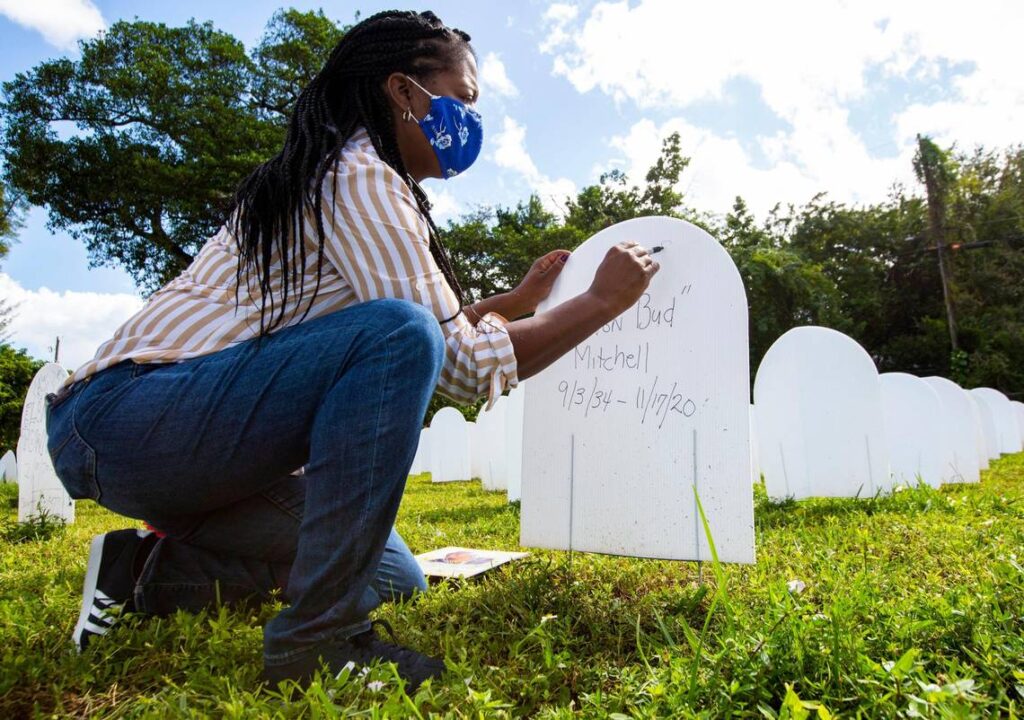MIAMI — Eric Pitts isn’t really in a celebratory mood.
The Liberty City native’s past six months have been the most difficult period of his life. In May, he lost his father, Reverend Marvin Pitts, 78, to COVID-19. A month and a half later, his mother, Dr. Dorothy Pitts, 77, succumbed to the coronavirus. The final death, this time that of his brother Marvin Pitts Jr., 48, came in July — while Eric himself was in the hospital fighting the same virus.
“I don’t really want to be bothered,” Pitts, 47, said Tuesday at an event arranged by Congresswoman Frederica Wilson. “I don’t want to be around family. I don’t want to see Christmas ornaments. I don’t want to see Christmas decorations. Those things bring back too many memories and it breaks my heart to even revisit those situations because that was the last time all of us were together, last Thanksgiving.”
Pitts is one of the thousands forced to spend the holiday season without a loved one due to COVID-19. In Miami-Dade County, where the coronavirus death rate for African Americans is about double that of their white counterparts, majority Black areas like Liberty City, Little Haiti and Overtown have been disproportionately affected. That’s one of the reasons Rep. Wilson, whose District 24 encompasses those neighborhoods, created a cemetery in Liberty City’s Simonoff Floral Park, with hundreds of symbolic tombstones for those lost to the virus. On Tuesday, it was expanded to 1,500.
“We’re losing our citizens and we need to make sure that they remember that we’re in the midst of a pandemic,” Wilson said. COVID-19 “is trending in the same ZIP Codes” ravaged by the HIV/AIDS epidemic at its height, she said.
About 50 million people are expected to travel in 2020 for Thanksgiving, according to the AAA. That’s down from the previous year’s record-setting number of 55 million — but not enough for Joanna Moore, who lost her mother, Patsy G, in August. She’s still trying to discourage large gatherings.
“It’s difficult to not be with family during the holidays,” Moore, who also spoke at Wilson’s cemetery Tuesday morning, acknowledged. “We’ve spent a lot of time away from family and we are becoming fatigued as a community. But we’re still at war with this virus.”
A nurse at Cleveland Clinic, Moore, 51, thought she and her three siblings were being extremely careful around their mother. Only the four of them could enter the matriarch’s home where they made sure to stay 6 feet apart. Everyone wore their mask everywhere. Handing washing and sanitizer were a must.
Still, the 79-year-old Patsy contracted the virus from a loved one and died in the hospital alone. Moore felt guilty.
“To lose someone to COVID, it’s different because you feel this could’ve been prevented,” Moore said. Even the words associated with the pandemic have become a trigger “because you have to hear about coronavirus every day.”
For audience member Wanda McKinney, 68, Moore’s impassioned speech Tuesday reinforced the importance of wearing masks — even inside the home. After losing her younger brother Willie Lee Scott Jr. to the virus in April, she cut invitations to her usual Thanksgiving dinner by half. The Liberty City native then issued an even stricter warning to her children on Tuesday.
“Don’t bring any strangers here,” McKinney told them.
The six months that have passed since her brother’s death have done little to alleviate McKinney’s grief, she said. When her family gathered earlier this month to celebrate what would’ve been Scott’s 57th birthday, she found it too painful to participate in the ceremonial balloon release. Known for his love of pranks, Scott’s presence would have been especially welcome at a Thanksgiving dinner very much in need of laughter.
“When he came home as a baby, my mom was sick and I had to take care of him,” McKinney said of the brother she called “Scotty.” “ .. He used to follow me everywhere I go. It’s just like I lost my child. I think that’s why I cry so much. He’s more than a brother to me because I raised him.”
As for Pitts, he’s still unsure what to do with his first Thanksgiving alone. He might go to the beach. He might stay home. Regardless of the location, self-reflection will definitely be on the menu.
“I’m going to take the time to meditate and get myself together, because it’s hard,” Pitts said.
While Pitts, Moore and McKinney have endured deep pain, unimaginable circumstances, each remains optimistic. Each powered through in his or her own way: prayer, family or simply spreading the word about the reality of COVID.
For her part, Moore will celebrate with a big Zoom dinner from home.
To those who are traveling, she’s has this to say: “We’re going to have death in our country because of it.”
—THE MIAMI HERALD
C. Isaiah Smalls II is a reporter covering race and culture for the Miami Herald. Previously, he worked for ESPN’s The Undefeated as part of their inaugural class of Rhoden Fellows. He is a graduate of both Columbia University and Morehouse College.



